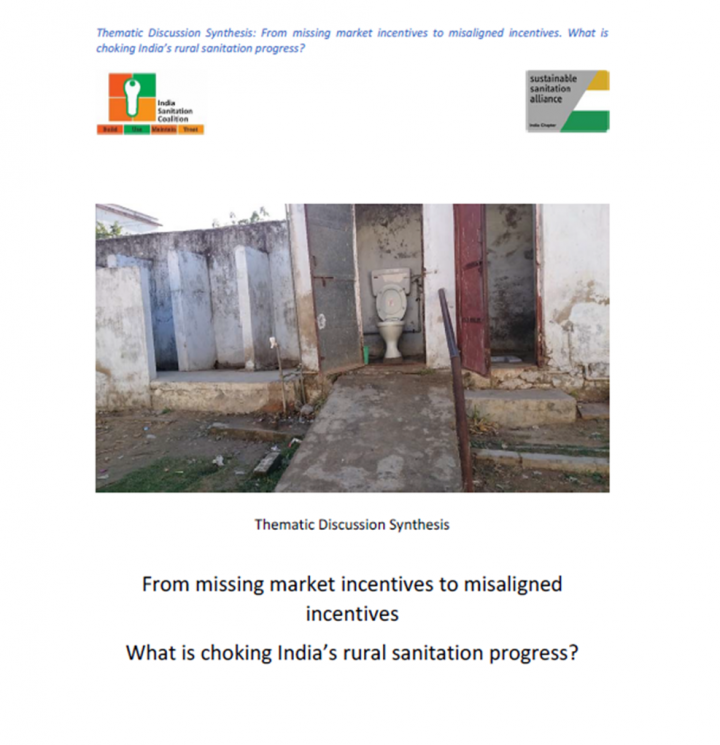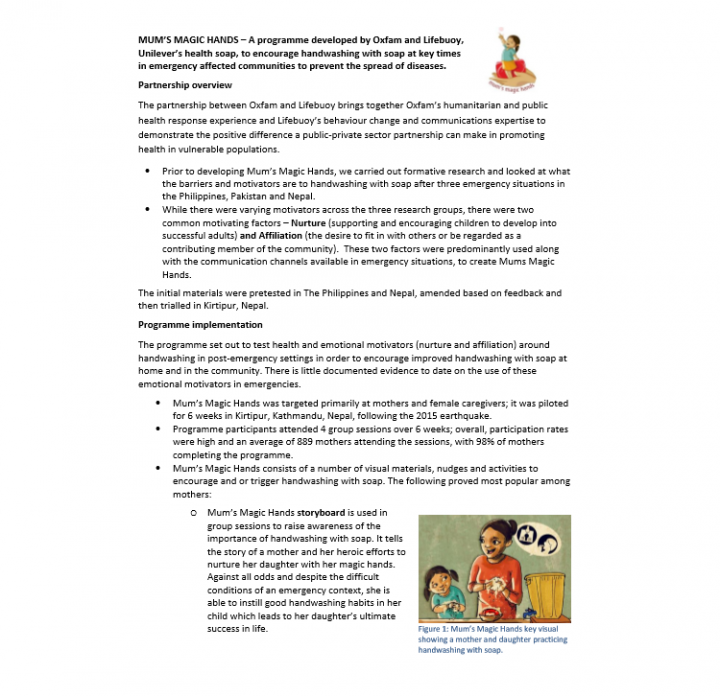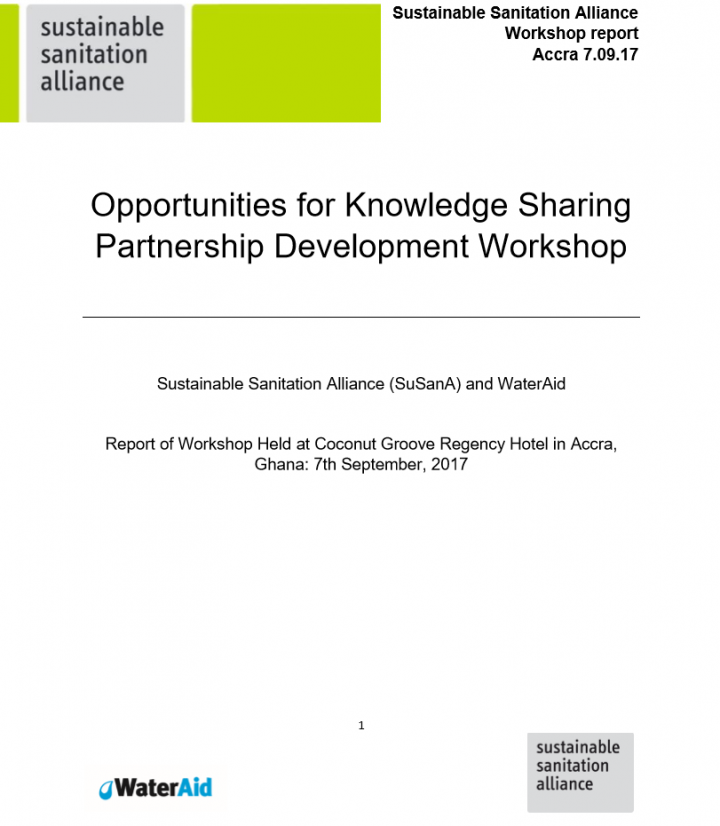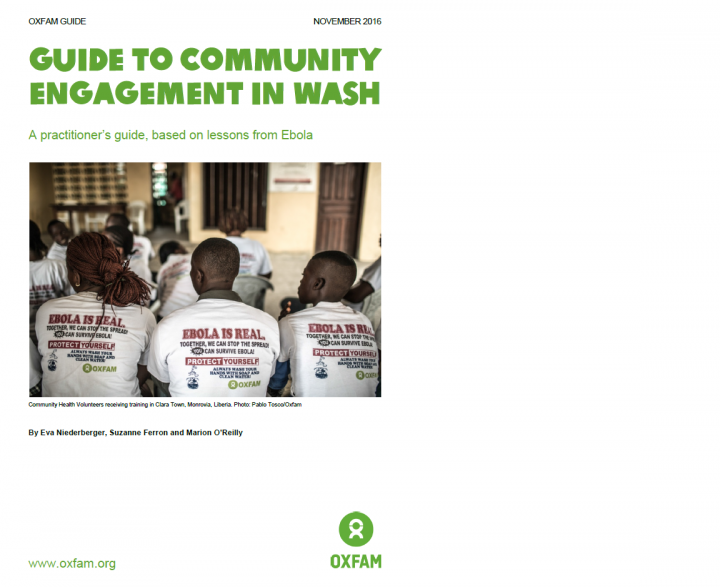Searching for information on Sanitation Workers?
The Sanitation Workers Knowledge + Learning Hub is the best source for all current news, trends, articles and updates on sanitation workers rights around the world.
Under the umbrella of the SuSanA Indian Chapter, the India Sanitation Coalition in partnership with Population Services International (PSI) and SuSanA, held a four-week thematic discussion on India's national rural sanitation programme, the Swachh Bharat Mission‐Gramin (SBM‐G).
Starting point for the discussion were findings from a PSI policy landscape study that reviewed existing …
Market based programming is increasingly heralded as having a critical place in the future of humanitarian programming. The proposed benefits of working through existing market systems include improvements to speed, efficiency and effectiveness of programming and increased beneficiary dignity and choice. Advocates for market based approaches claim that, where feasible, they promote economic …
GIZ-RUWASS program is supporting the improvement of the Ugandan water and sanitation sector through various projects. Amongst these projects is the USAID and GIZ co-funded project 'Capacity development of Town Councils to design and implement integrated and sustainable town sanitation plans'. The objective of the project is to make use of Town Sanitation Plans as a basis for planning and …
Addressing gender inequality and disability rights is critical to a rights-based approach to water, sanitation and hygiene (WASH) programming. Rights-based WASH should reflect all human rights principles, including ‘equality
and non-discrimination’, and ‘participation and inclusion’. Approaching WASH with an inclusive lens is essential for achieving universal acces.
This paper centres …
Background Research suggests that the lived experience of inadequate sanitation may contribute to poor health outcomes above and beyond pathogen exposure, particularly among women. The goal of this research was to understand women’s lived experiences of sanitation by documenting their urination-related, defecation-related and menstruation-related concerns, to use findings to develop a …
Women and girls are especially affected by inadequate sanitation because of gender related differences - cultural and social factors - but also because of sex-related differences - physiological factors. Gender refers to the social differences and relations between men and women which are learned and often constructed and which differ in various societies and can change over time.
There are …
While women and girls face special risks from lack of access to sanitation facilities, their ability to participate and influence household-level sanitation is not well understood. This paper examines the association between women’s decision-making autonomy and latrine construction in rural areas of Odisha, India.
A mixed-method study among rural households was conducted in Puri district. This …
Women face greater challenges than men in accessing water, sanitation, and hygiene (WASH) resources to address their daily needs, and may respond to these challenges by adopting unsafe practices that increase the risk of reproductive tract infections (RTIs). WASH practices may change as women transition through socially-defined life stage experiences, like marriage and pregnancy. Thus, the …
A lack of decent toilets and clean water causes diarrhoeal diseases that, on average, claim the lives of almost 800 children every day – one every two minutes.
The health impacts of poor sanitation trap people in poverty, making it difficult to get an education or to work to support their families.
The State of the World’s Toilets 2017 explores how the lack of decent toilets around the …
Sustainable Development Goal 6 (Goal 6) to ‘ensure availability and sustainable management of water and sanitation for all’ requires explicit attention to gender equality and inclusion. Universal access to safely managed water, sanitation and hygiene (WASH) and appropriate management of water resources will only be achieved if the rights of women and marginalised people are fulfilled. The …
A gender-sensitive approach to ensure equity in WASH programs can achieve positive and sustainable outcomes, including participatory decisionmaking and empowerment of women. Gender analysis frameworks have a long history in development practice to guide strengthened gender outcomes, and opportunities exist to learn from such frameworks to support implementation of WASH programs in developing …
Effective gender-responsive programming in the Water, Sanitation and Hygiene (WASH) sector can contribute to progress towards gender equality and important WASH results. This document outlines essential elements that WASH practitioners should take into account at all points in the programme cycle in order to enhance a gender-responsive approach to their work.
Ensuring that women and girls have …
Access to adequate water and sanitation services is essential for good individual and population health. People served by small-scale systems in rural areas and small towns have the right to the same level of health protection as others. Goals 3 and 6 of the 2030 Agenda for Sustainable Development call for combating of waterborne diseases and for ensuring universal and equitable access to both …
An overview of the partnership between Oxfam and Lifebuoy that brings together Oxfam’s humanitarian and public health response experience and Lifebuoy’s behaviour change and communications expertise to demonstrate the positive difference a public-private sector partnership can make in promoting health in vulnerable populations.
Mokhada is located at the foot of the Deccan Trap system. The soil is made of early Eocene basalt layers of volcanic origin. Igneous soils such as basalt are usually productive in terms of aquifer as they have a double storage capacity – they are porous due to the nature of the stone and they are cracked due to the structure of the rock formation. They have a good porosity and a high …
WaterAid UK, WaterAid Ghana, and the Sustainable Sanitation Alliance (SuSanA) platform in partnership with Ghana’s Ministry of Sanitation and Water Resources (MSWR) organised a one-day workshop in Accra, Ghana: 7th September, 2017 on opportunities for knowledge sharing partnership via the SuSanA platform.
BORDA-DEWATS constitutes the treatment element of a sanitation concept that starts with the individual user interface, the toilet, and continues with a simplified sewer system that connects a neighbourhood of less than 10 households up to a few hundred households. The collected wastewater then enters the treatment stage. Solid matter sediments under anaerobic conditions and decomposes by …
Handwashing with soap is the single most effective way to prevent infectious diseases. Regular handwashing, specifically after using the toilet and before eating should be part of a daily routine in everyone’s life. Schools, kindergardens, day care centers, hospitals, bus-stations, canteens are public places, where handwashing should be made possible for many people at the same time.
In the …
This guide is a compilation of best practices and key lessons learned through Oxfam’s experience of community engagement during the 2014–15 Ebola response in Sierra Leone and Liberia. It aims to inform public health practitioners and programme teams about the design and implementation of community-centred approaches.








































